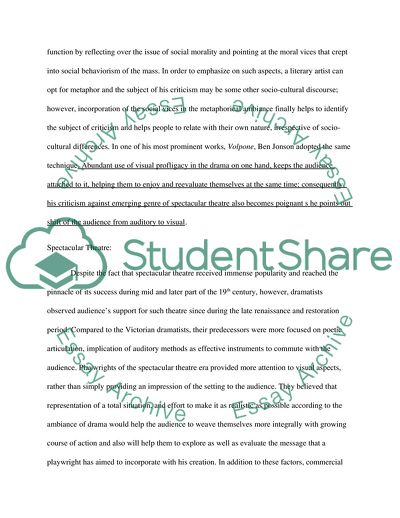Cite this document
(Ben Jonson's Volpone Report Example | Topics and Well Written Essays - 2250 words, n.d.)
Ben Jonson's Volpone Report Example | Topics and Well Written Essays - 2250 words. https://studentshare.org/performing-arts/1740304-how-ben-jonson-uses-the-profligacy-of-visual-spectacle-in-volpone-to-critique-the-emerging-genre-of-spectacular-theater-focusing-on-what-is-seen-rather-than-what-is-heard
Ben Jonson's Volpone Report Example | Topics and Well Written Essays - 2250 words. https://studentshare.org/performing-arts/1740304-how-ben-jonson-uses-the-profligacy-of-visual-spectacle-in-volpone-to-critique-the-emerging-genre-of-spectacular-theater-focusing-on-what-is-seen-rather-than-what-is-heard
(Ben Jonson'S Volpone Report Example | Topics and Well Written Essays - 2250 Words)
Ben Jonson'S Volpone Report Example | Topics and Well Written Essays - 2250 Words. https://studentshare.org/performing-arts/1740304-how-ben-jonson-uses-the-profligacy-of-visual-spectacle-in-volpone-to-critique-the-emerging-genre-of-spectacular-theater-focusing-on-what-is-seen-rather-than-what-is-heard.
Ben Jonson'S Volpone Report Example | Topics and Well Written Essays - 2250 Words. https://studentshare.org/performing-arts/1740304-how-ben-jonson-uses-the-profligacy-of-visual-spectacle-in-volpone-to-critique-the-emerging-genre-of-spectacular-theater-focusing-on-what-is-seen-rather-than-what-is-heard.
“Ben Jonson'S Volpone Report Example | Topics and Well Written Essays - 2250 Words”. https://studentshare.org/performing-arts/1740304-how-ben-jonson-uses-the-profligacy-of-visual-spectacle-in-volpone-to-critique-the-emerging-genre-of-spectacular-theater-focusing-on-what-is-seen-rather-than-what-is-heard.


